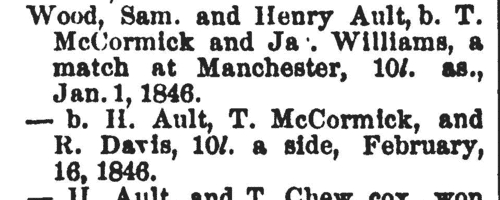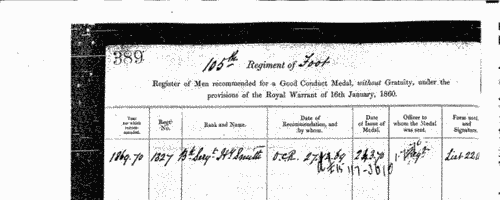Leddy Surname Ancestry ResultsOur indexes 1000-1999 include entries for the spelling 'leddy'. In the period you have requested, we have the following 25 records (displaying 1 to 10): Single Surname Subscription | | | Buying all 25 results of this search individually would cost £146.00. But you can have free access to all 25 records for a year, to view, to save and print, for £100. Save £46.00. More... |
These sample scans are from the original record. You will get scans of the full pages or articles where the surname you searched for has been found. Your web browser may prevent the sample windows from opening; in this case please change your browser settings to allow pop-up windows from this site. Merchants and Traders in Dublin (1830)
Wilson's Dublin Directory for the year 1830 lists merchants and traders alphabetically by surname, with christian name or initials, trade, and (in italics) address.
LEDDY. Cost: £8.00.  | Sample scan, click to enlarge

| Poachers committed to prison in Worcestershire
(1833-1836)
In response to a parliamentary enquiry, returns were made in early 1836 from each of the gaols in England and Wales of the number of commitments, prosecutions, convictions and sentences under the game laws since 1 November 1833. The returns varied in scope; most give the full name of each poacher, date, and sentence. The usual offence is that of 'poaching', i. e. being out armed in the night in pursuit of game; occasionally it was aggravated by assaulting a gamekeeper &c.LEDDY. Cost: £6.00.  | Sample scan, click to enlarge

| Irish Insolvents
(1844)
Insolvency notices for Ireland: insolvency often caused people to restart their lives elsewhere, so these are an important source for lost links, especially for emigrantsLEDDY. Cost: £6.00.  | Sample scan, click to enlarge

| Watermen rowers
(1835-1851)
Rowing was one of the English sports covered in detail in the pages of Bell's Life in London, and from these was compiled a compendium called the Aquatic Oracle. The text is divided into two main parts: Gentlemen Amateurs and Watermen. All the entries are cross-referenced, and use these abbreviations: w., won; l., lost; b., beat; bn., beaten; sc. ma., scullers' match; o. ma., oars match; do. sc. ma., double scullers' match; 4 o.ma., 4 oars match; 8 o. ma., 8 oars match; sk., stroke; cox., coxswain; as., a side; Oxon., Oxonian; V. to P., Vauxhall to Putney; W. to P., Westminster to Putney; P. to M., Putney to Mortlake; M. to P., Mortlake to Putney; dis., distance.LEDDY. Cost: £6.00.  | Sample scan, click to enlarge

| Students entering the Albert National Agricultural Training Institution, Dublin
(1855)
This register of internal students gives full name; date of entry; date of leaving; time spent at the institution (in years and months); and, particularly interesting, 'destination of leaving' - such as 'Teacher in Tullamore Workhouse School', 'Emigrated to America', 'Agriculturist at Dunmanway'.LEDDY. Cost: £6.00.  | Sample scan, click to enlarge

|  London Policemen
(1843-1857) London Policemen
(1843-1857)
The Metropolitan Police Register of Joiners (MEPO 4/334) lists policemen joining the force 1 January 1843 to 1 April 1857 (warrant numbers 19893 to 35804). The register is alphabetical, in so far as the recruits are listed chronologically grouped under first letter of surname. It gives Date of Appointment, Name, Number of Warrant, Cause of Removal from Force (resigned, dismissed, promoted or died), and Date of Removal. Although the register was closed for new entrants at the end of 1842, the details of removals were always recorded, some being twenty or more years later. Those recruits not formerly in the police, the army, or some government department, were required to provide (normally) at least two letters of recommendation from persons of standing, and details of these are entered on the facing pages: the names in these are indexed separately - this index refers only to the police constables. Where a recruit was only recently arrived in the metropolis, the names and addresses of the recommenders can be invaluable for tracing where he came from.LEDDY. Cost: £8.00.  | Sample scan, click to enlarge

|  Royal Artillery fighting in China
(1856-1860) Royal Artillery fighting in China
(1856-1860)
The China Medal was awarded to soldiers and sailors who took part in the prosecution of the war against the Chinese from 1856 to 1860. Separate clasps were awarded for men who had been in receipt of the China Medal of 1842; for being actually present at Canton on 28 and 29 December 1857, when that city was bombarded and finally captured; for being actually engaged in the operations which ceased with the first capture of the Taku Forts, 20 May 1858, and led to the Treaty of Tientsin; for being actually present at the capture of the Taku Forts 21 August 1860; and for being actually present before Pekin the day the gate of that city was given up to the allied (British and French) army, viz. on 13 October 1860. Several batteries of the Royal Artillery took part in these actions.LEDDY. Cost: £8.00.  | Sample scan, click to enlarge

|  Sailors and marines on board Her Majesty's ship Actaeon
(1856-1860) Sailors and marines on board Her Majesty's ship Actaeon
(1856-1860)
The China Medal was awarded to soldiers and sailors involved in the various actions of the war against China, in which this ship was engaged from 1856 to 1860. The medals were either delivered on board or sent on in 1862: except that many of the men were no longer immediately traceable, and the remarks on the roll show that some medals were not sent on for several years, and some were never sent. After the main roll there is a section showing which of the men also qualified for clasps. Separate clasps were awarded for men who had been in receipt of the China Medal of 1842; for the taking of Fatshan in 1857, Canton in 1857, Taku Forts in 1858, Taku Forts in 1860, and Pekin in 1860. Most of the men on this ship are shown as having been given the Canton clasp, for being actually present at Canton on 28 and 29 December 1857, when that city was bombarded and finally captured.LEDDY. Cost: £8.00.  | Sample scan, click to enlarge

|  British infantry fighting in China
(1860) British infantry fighting in China
(1860)
The China Medal was awarded to soldiers and sailors who took part in the prosecution of the war against the Chinese from 1856 to 1860. Separate clasps were awarded for men who had been in receipt of the China Medal of 1842; for being actually present at Canton on 28 and 29 December 1857, when that city was bombarded and finally captured; for being actually engaged in the operations which ceased with the first capture of the Taku Forts, 20 May 1858, and led to the Treaty of Tientsin; for being actually present at the capture of the Taku Forts 21 August 1860; and for being actually present before Pekin the day the gate of that city was given up to the allied (British and French) army, viz. on 13 October 1860. The 31st (the Huntingdonshire) Regiment of Foot, based at Chatham, embarked for Corfu 24 January 1853, served in the Crimea, had arrived in India by 1859, and was transferred to China in 1860, returning to England in 1863. The regiment took part in the capture of the Taku Forts.LEDDY. Cost: £8.00.  | Sample scan, click to enlarge

|  Outstanding soldiers of the 13th regiment of Foot
(1860-1870) Outstanding soldiers of the 13th regiment of Foot
(1860-1870)
The 13th, or Prince Albert's Regiment of Light Infantry was in two battalions. The 1st battalion embarked for Gibraltar in 1851, and served successively in the Crimea, at the Cape of Good Hope, and in India (1857 to 1864, being based at Gorruckpore). The home depot was at Fermoy in Ireland. Having returned to England in 1864, the battalion was moved to Ireland in 1866, and to Gibraltar in 1867. The second battalion was also based at Fermoy, but embarked for the Cape in 1859, thence to Mauritius in 1863, and back to England in 1867. Each year just a handful of outstanding soldiers of the regiment were chosen for good conduct medals and gratuities: these are listed here. There were two lists, one for men recommended for the Good Conduct Medal without a gratuity, and one for gratuities - £5 to a private, £10 to a corporal, and £15 to a serjeant. Both lists are indexed here, and each gives rank, name, regimental number, date of recommendation and date of issue. (The sample scan is from the 105th foot)LEDDY. Cost: £8.00.  | Sample scan, click to enlarge

|
Research your ancestry, family history, genealogy and one-name study by direct access to original records and archives indexed by surname.
|













